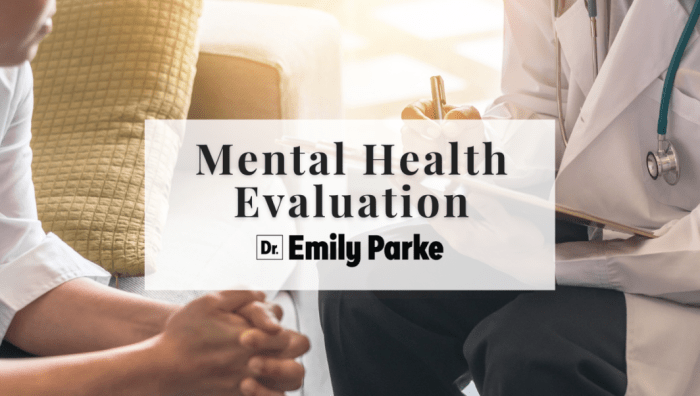The mental health status exam, a cornerstone of mental health assessment, provides a structured framework for evaluating an individual’s psychological well-being. This comprehensive evaluation delves into various aspects of mental health, including mood, behavior, thoughts, and cognitive function, offering valuable insights into a person’s overall mental state.
By examining a range of factors, the mental health status exam aids in identifying potential mental health concerns, guiding diagnosis, and facilitating the development of appropriate treatment plans. It serves as a crucial tool for clinicians, researchers, and other mental health professionals, enabling them to gain a deeper understanding of an individual’s mental health and tailor interventions to meet their specific needs.
What is a Mental Health Status Exam?

A mental health status exam is a comprehensive assessment used by mental health professionals to evaluate a person’s current mental state. It’s like a snapshot of someone’s mental well-being at a specific point in time.
Purpose of a Mental Health Status Exam
Mental health status exams are conducted to gather information about a person’s mental health, allowing healthcare providers to:* Identify potential mental health conditions:The exam helps in recognizing signs and symptoms of various mental health disorders.
Assess the severity of symptoms
The exam provides insights into the intensity and impact of mental health issues.
Monitor treatment progress
The exam allows healthcare providers to track changes in a person’s mental state over time, evaluating the effectiveness of treatment interventions.
Develop a treatment plan
The exam provides crucial information for creating a tailored treatment plan that addresses specific needs and challenges.
Components of a Mental Health Status Exam
A mental health status exam typically includes several components, each providing a different perspective on a person’s mental state.
Appearance and Behavior
This component assesses a person’s physical appearance, including their dress, hygiene, and overall presentation. It also observes their behavior, such as their posture, eye contact, and mannerisms. * Example questions:
“How would you describe your current mood?”
A mental health status exam can be a crucial part of a comprehensive health assessment. While it might seem like a different realm, the physical benefits of activities like a beauty barre class can also positively impact mental well-being. The combination of strength training, stretching, and mindfulness can contribute to improved mood and overall mental health, which are often addressed during a mental health status exam.
“Have you noticed any changes in your sleep patterns?”
“Have you been feeling more anxious or irritable lately?”
Mood and Affect
This component explores a person’s subjective emotional state, including their mood, feelings, and emotional range. * Example questions:
“How are you feeling today?”
“Are you experiencing any sadness, anxiety, or anger?”
“Do you have any difficulty controlling your emotions?”
Thought Process and Content
This component examines a person’s thinking patterns, including their ability to think clearly, logically, and coherently. It also explores their thought content, assessing for any unusual or disturbing thoughts. * Example questions:
“Can you tell me about your thoughts right now?”
“Are you experiencing any racing thoughts or difficulty concentrating?”
“Have you had any thoughts of harming yourself or others?”
Sensorium and Cognition
This component evaluates a person’s awareness of their surroundings and their cognitive abilities, including their attention, memory, and orientation. * Example questions:
“What is your name and where are you right now?”
“Can you remember what you had for breakfast this morning?”
“Can you follow simple instructions?”
Insight and Judgment
This component assesses a person’s understanding of their own mental state and their ability to make sound decisions. * Example questions:
“Do you believe you have a mental health problem?”
“How do you think your current situation will affect your future?”
“Can you explain why you made a particular decision?”
Impulse Control
This component evaluates a person’s ability to control their impulses and urges. * Example questions:
“Do you have any difficulty controlling your anger or frustration?”
“Do you have any urges to engage in risky or harmful behaviors?”
Risk Assessment
This component assesses a person’s risk of harming themselves or others. * Example questions:
“Have you ever thought about harming yourself or others?”
“Do you have access to any weapons or medications that could be harmful?”
Types of Mental Health Status Exams

Mental health status exams can be conducted in different ways, depending on the purpose and setting. The two main types of exams are structured and unstructured.
Structured Mental Health Status Exams
Structured exams follow a standardized format, with specific questions and criteria used to assess a patient’s mental health. This approach ensures consistency and reliability in data collection, making it easier to compare findings across different patients and settings.
Advantages of Structured Exams
- Increased reliability and consistency:Standardized questions and criteria ensure that all patients are assessed using the same measures, reducing bias and variability in the data.
- Improved objectivity:The structured format minimizes the influence of the examiner’s subjective interpretations, leading to more objective assessments.
- Facilitates data analysis and comparison:Standardized data collection makes it easier to analyze and compare findings across different patients, settings, and time points.
- Suitable for research and large-scale studies:Structured exams are often used in research studies to ensure consistent data collection and allow for reliable comparisons between groups.
Disadvantages of Structured Exams
- Can be rigid and inflexible:The standardized format may not always capture the nuances of individual patients’ experiences.
- May not be suitable for all patients:Some patients may find the structured format too formal or impersonal, which could affect their willingness to share information.
- Can be time-consuming:The comprehensive nature of structured exams can require significant time to complete.
Unstructured Mental Health Status Exams
Unstructured exams are more flexible and allow the examiner to tailor the assessment to the individual patient’s needs and concerns. This approach provides more freedom to explore specific issues and gather detailed information.
Advantages of Unstructured Exams
- Flexibility and adaptability:The examiner can adjust the questions and focus areas based on the patient’s individual needs and concerns.
- Enhanced rapport building:The more open-ended format can foster a more natural and comfortable interaction between the examiner and patient, leading to greater trust and rapport.
- Can uncover hidden issues:The flexibility of unstructured exams allows the examiner to explore areas that might not be covered in a structured format, potentially revealing important information that could be missed otherwise.
Disadvantages of Unstructured Exams
- Potential for bias:The lack of standardization can introduce bias in the assessment, as different examiners may interpret the same information differently.
- Difficult to compare findings:The variability in questions and criteria makes it challenging to compare findings across different patients and settings.
- May not be suitable for research:Unstructured exams are generally not recommended for research studies due to the lack of standardization and difficulty in analyzing data.
Administration and Interpretation

Administering a mental health status exam involves a structured process of gathering information about an individual’s mental state. It’s crucial to conduct this exam in a comfortable and safe environment to encourage open and honest communication. Interpreting the results requires careful consideration of the gathered information, along with an understanding of the individual’s background and context.
A mental health status exam is a crucial part of understanding a person’s overall well-being. While it’s important to address mental health concerns, it’s also vital to consider factors like nutrition. Some people find that incorporating healthy beverages, such as health ade kombucha tea , into their diet can support their overall health and potentially contribute to a positive mental state.
Ultimately, a holistic approach to mental health considers all aspects of a person’s life, including their dietary choices.
Administering the Exam
Creating a comfortable and safe environment is essential for the administration of a mental health status exam. This fosters trust and encourages the individual to share their experiences openly.
- Privacy and Confidentiality:Ensure a private and confidential setting, free from distractions. This allows the individual to feel safe sharing sensitive information.
- Non-judgmental Approach:Maintain a non-judgmental and empathetic demeanor throughout the exam. Avoid interrupting or dismissing the individual’s experiences.
- Clear Communication:Use clear and concise language, avoiding jargon or complex terminology. Explain the purpose of the exam and the importance of their participation.
The process of administering a mental health status exam involves:
- Gathering Demographics:This includes basic information such as age, gender, occupation, and education level.
- Reviewing Medical History:Inquire about past medical illnesses, current medications, and any previous mental health diagnoses or treatments.
- Assessing Appearance and Behavior:Observe the individual’s physical appearance, posture, eye contact, and overall demeanor.
- Evaluating Mood and Affect:Explore the individual’s subjective experience of their mood, including their emotional range and reactivity.
- Assessing Thought Processes:Examine the clarity, coherence, and organization of their thoughts, including any unusual or illogical thinking patterns.
- Evaluating Sensorium and Cognition:Assess their level of awareness, orientation, memory, and attention span.
- Exploring Insight and Judgment:Determine their ability to understand their situation and make sound decisions.
- Assessing Risk Factors:Identify any potential risks to themselves or others, including suicidal ideation or homicidal thoughts.
Interpreting the Results
Interpreting the results of a mental health status exam requires careful consideration of the gathered information, along with an understanding of the individual’s background and context.
A mental health status exam is a comprehensive assessment that helps identify and address mental health concerns. Just as a physical exam checks for bodily issues, a mental health exam explores emotional well-being. While focusing on mental health, it’s important to remember the connection between mind and body.
For example, a good skincare routine can boost self-esteem, and products like the first aid beauty repair cream can help address skin issues that may contribute to feelings of insecurity. Ultimately, a holistic approach to well-being, encompassing both mental and physical health, is crucial for overall happiness.
- Consider the Context:It’s crucial to understand the individual’s cultural background, socioeconomic status, and life experiences to interpret the results accurately.
- Look for Patterns:Identify any recurring themes or patterns in their responses and behaviors. This can provide insights into their overall mental state.
- Compare to Baseline:If available, compare the current exam results to previous assessments. This can help determine if there are any significant changes in their mental health.
- Integrate Multiple Sources:Consider information from other sources, such as medical records, family members, or previous therapists. This provides a more comprehensive understanding of the individual’s mental health.
It’s important to note that a mental health status exam is just one piece of the puzzle in assessing an individual’s mental health. Further evaluation and treatment may be necessary based on the findings of the exam.
Uses and Applications

Mental health status exams are versatile tools employed in various settings, contributing significantly to understanding and managing mental health. Their applications range from clinical assessments to research endeavors, providing valuable insights into an individual’s mental state.
Applications in Different Settings, Mental health status exam
Mental health status exams find utility in a wide array of settings, each with specific objectives:
| Setting | Uses |
|---|---|
| Clinical Settings |
|
| Research Settings |
|
| Educational Settings |
|
| Forensic Settings |
|
Contribution to Diagnosis and Treatment Planning
Mental health status exams play a crucial role in the diagnostic process and subsequent treatment planning. They provide a comprehensive overview of an individual’s mental state, aiding clinicians in:
- Identifying potential mental health disorders: The exam helps identify symptoms that align with specific diagnostic criteria for various mental health conditions.
- Formulating a differential diagnosis: By comparing the observed symptoms with the characteristics of different disorders, clinicians can narrow down the possibilities and arrive at a more accurate diagnosis.
- Developing a personalized treatment plan: The information gathered from the exam guides the selection of appropriate therapeutic interventions, including medication, therapy, or a combination of both.
- Monitoring treatment progress: Regular mental health status exams allow clinicians to track changes in symptoms, assess the effectiveness of treatment, and make adjustments as needed.
Scenarios Where a Mental Health Status Exam is Particularly Beneficial
Mental health status exams are particularly valuable in specific scenarios, including:
- Individuals presenting with new or worsening mental health symptoms: The exam helps identify the nature and severity of the symptoms, guiding the clinician in determining the appropriate course of action.
- Patients experiencing difficulties with existing treatments: The exam can reveal changes in mental state or the emergence of new symptoms, suggesting the need for treatment modifications.
- Individuals undergoing significant life changes: Major life events (e.g., loss of a loved one, job loss, relocation) can impact mental health, and a mental health status exam can help assess potential vulnerabilities and provide support.
- Individuals with chronic medical conditions: Mental health disorders can co-occur with chronic physical illnesses, and a mental health status exam can help identify and manage any psychological distress.
- Individuals in crisis situations: In cases of acute mental health distress, the exam can quickly assess the severity of the situation and guide immediate interventions.
Ethical Considerations

Mental health status exams are powerful tools for understanding and addressing mental health concerns. However, their use carries significant ethical implications that must be carefully considered. These implications are rooted in the fundamental principles of respect for autonomy, beneficence, non-maleficence, and justice, which guide ethical practice in healthcare.
Confidentiality and Informed Consent
Confidentiality is paramount in mental health care. The information shared during a mental health status exam is often deeply personal and sensitive. Maintaining confidentiality is crucial to fostering trust and ensuring that individuals feel safe and comfortable disclosing their experiences.
Informed consent is the process of ensuring that individuals understand the nature, risks, and benefits of the exam before they agree to participate. This involves clearly explaining the purpose of the exam, the information that will be collected, how it will be used, and the potential consequences of sharing this information.
Potential Biases
Mental health status exams are not immune to biases. These biases can stem from various sources, including the examiner’s own personal beliefs, cultural background, and training. For example, an examiner who holds negative stereotypes about certain mental health conditions might be more likely to misinterpret or overlook important information during the exam.
Additionally, the exam itself might be biased, with certain questions or assessments being more likely to disadvantage individuals from marginalized groups.
- Cultural biases:Mental health presentations can vary across cultures. For instance, a patient from a collectivist culture might express distress through somatic symptoms rather than emotional ones. An examiner unfamiliar with these cultural nuances might misinterpret the patient’s presentation.
- Gender biases:Certain mental health conditions, like depression, are often diagnosed more frequently in women. This might be due to societal expectations and gender roles that can lead to women being more likely to seek help for emotional distress. An examiner who is unaware of these biases might over-diagnose depression in women and under-diagnose it in men.
- Socioeconomic biases:Individuals from lower socioeconomic backgrounds may have limited access to mental health care and may be more likely to experience stress and trauma due to poverty and social inequality. An examiner who is not aware of these factors might misinterpret the patient’s presentation as a reflection of personal weakness rather than social circumstances.
Challenges and Limitations
Mental health status exams, while valuable tools, are not without their limitations. Several challenges and potential pitfalls can affect the accuracy and effectiveness of these assessments, highlighting the need for a comprehensive approach to understanding mental health.
Challenges in Conducting and Interpreting Mental Health Status Exams
Several factors can influence the quality and reliability of mental health status exams.
- Subjectivity and Bias:Mental health assessments rely heavily on self-reported information, which can be influenced by personal biases, social desirability, and the individual’s ability to accurately reflect their internal experiences.
- Cultural Influences:Cultural factors can significantly impact how individuals express and perceive mental health issues. What is considered normal or abnormal behavior can vary widely across cultures, making it challenging to interpret symptoms universally.
- Language Barriers:Communication difficulties, including language barriers, can hinder the effectiveness of mental health assessments. Accurate understanding and interpretation of questions and responses are essential for reliable evaluation.
- Limited Scope:Mental health status exams typically focus on a specific set of symptoms and may not capture the full complexity of an individual’s mental health. They may miss underlying issues or nuances that require further investigation.
- Lack of Standardization:Different mental health professionals may use varying assessment tools and approaches, leading to inconsistencies in the interpretation of results.
Limitations of Relying Solely on a Mental Health Status Exam for Diagnosis
Mental health status exams are valuable screening tools, but they are not a substitute for a comprehensive diagnostic evaluation.
- Oversimplification:Mental health status exams often provide a snapshot of an individual’s mental state at a particular point in time, failing to consider the dynamic nature of mental health and the influence of environmental factors.
- Ignoring Context:Mental health issues are often intertwined with an individual’s social, cultural, and personal history. Mental health status exams may not adequately account for these contextual factors.
- Risk of Misdiagnosis:Relying solely on a mental health status exam for diagnosis can lead to misdiagnosis, particularly in cases where symptoms overlap or are influenced by other factors.
Importance of Considering Cultural Factors and Individual Differences
Understanding the cultural context and individual differences is crucial for accurate interpretation of mental health status exams.
- Cultural Sensitivity:Mental health professionals must be culturally sensitive and aware of how cultural norms and beliefs may influence an individual’s presentation of symptoms and their willingness to disclose personal information.
- Individual Variation:Individuals experience mental health issues differently. It is essential to consider individual factors such as personality, coping mechanisms, and life experiences when interpreting assessment results.
- Tailored Approach:Mental health assessments should be tailored to the individual’s cultural background, language, and personal circumstances to ensure accurate and culturally appropriate evaluation.
Future Directions
The field of mental health status exams is constantly evolving, driven by advancements in technology, research, and an increasing understanding of mental health conditions. This ongoing evolution promises to improve the accuracy, effectiveness, and accessibility of these exams, leading to better diagnoses and more personalized treatment plans.
Integration of Technology
The use of technology is poised to revolutionize the administration and interpretation of mental health status exams.
- Digital Platforms:Mobile apps and online platforms can provide convenient and accessible tools for self-administered mental health assessments. These platforms can collect data on a larger scale, enabling researchers to study trends and identify patterns in mental health across populations.
- Artificial Intelligence (AI):AI algorithms can analyze large datasets of patient information, including exam results, medical history, and demographic data, to identify patterns and predict potential mental health issues. This can help clinicians prioritize patients for early intervention and tailor treatment plans more effectively.
- Virtual Reality (VR):VR technology can create immersive environments that simulate real-life scenarios, allowing clinicians to assess patients’ reactions to stressful situations or social interactions. This can provide valuable insights into their coping mechanisms and potential areas for intervention.
End of Discussion

In conclusion, the mental health status exam plays a vital role in promoting mental well-being by providing a structured and comprehensive assessment of an individual’s psychological state. This powerful tool aids in identifying mental health concerns, guiding diagnosis, and informing treatment planning, ultimately contributing to the development of personalized interventions that address the unique needs of each individual.
As the field of mental health continues to evolve, the mental health status exam will undoubtedly remain an essential instrument for advancing our understanding and care for mental health.
Quick FAQs
What are the benefits of a mental health status exam?
A mental health status exam offers several benefits, including early identification of mental health concerns, accurate diagnosis, personalized treatment planning, and monitoring progress over time.
Who should undergo a mental health status exam?
Individuals experiencing emotional distress, changes in behavior, or concerns about their mental health should consider a mental health status exam. It is also recommended for individuals seeking a comprehensive assessment of their mental well-being or those involved in clinical research.
Is a mental health status exam the same as a psychological test?
While both involve assessing mental health, a mental health status exam is a broader evaluation, while psychological tests are specific instruments designed to measure particular psychological constructs, such as intelligence or personality traits.
What should I expect during a mental health status exam?
A mental health status exam typically involves a conversation with a qualified mental health professional. You may be asked questions about your mood, thoughts, behaviors, and past experiences. The exam may also include a physical examination to rule out any underlying medical conditions that could be affecting your mental health.